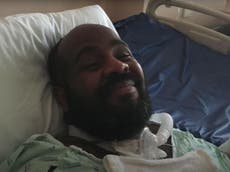Our human rights were already in a fragile place before coronavirus. Now it’s a whole lot worse
I often engage in dialogue with naysayers who broadly believe human rights violations occur in far-off places and that we operate as a free and open democracy. This is far from the truth

Your support helps us to tell the story
From reproductive rights to climate change to Big Tech, The Independent is on the ground when the story is developing. Whether it's investigating the financials of Elon Musk's pro-Trump PAC or producing our latest documentary, 'The A Word', which shines a light on the American women fighting for reproductive rights, we know how important it is to parse out the facts from the messaging.
At such a critical moment in US history, we need reporters on the ground. Your donation allows us to keep sending journalists to speak to both sides of the story.
The Independent is trusted by Americans across the entire political spectrum. And unlike many other quality news outlets, we choose not to lock Americans out of our reporting and analysis with paywalls. We believe quality journalism should be available to everyone, paid for by those who can afford it.
Your support makes all the difference.In Britain, we often take our rights to democratically challenge the government and public services for granted. We rarely take the time to understand them, reflect on them and ensure they are upheld for our own sakes.
A silent war is being fought every day to uphold these rights in our own country, but I worry that the enemy is advancing, using sly tactics and underhand measures. For example, a September headline read how Boris Johnson planned on “opting out” of human rights laws amid a Brexit row. Was the government floating the idea of cherry-picking the human rights laws it likes and simply ‘opting out’ of the rest? Would the public even be alarmed if this did happen?
The story of human rights protections has a long history, beginning with the Magna Carta in 1215. Jump a few centuries and, following the atrocities of World War ll, the UN created the Universal Declaration of Human Rights which is still seen as the foundation of modern human rights law across the world. In 1951, the UK adopted the European Convention on Human Rights (ECHR), but it wasn’t transcribed to UK law until 1998 via the Human Rights Act. The Equality Act of 2010 follows and introduced protections for nine characteristics, including age, disability and race.
In my line of work, I often engage in dialogue with naysayers who broadly believe human rights violations occur in far-off places and that we operate as a free and open democracy. This is far from the truth, with the Cato Institute’s 2019 International Human Freedom Index ranking us at number 14 in the world – down five places from the previous survey.
But sometimes in this field, it can take one step back in order to make two steps forward. For example, in health and social care, recent breaches led to a strengthening of rights, including making decisions in a patient’s best interests, a parent’s right to object to medical treatment of their children and prevention of the mistreatment of vulnerable and elderly patients.
However elsewhere, there is plenty to be worried about. Random stop-and-search by the police continues, despite serious concerns about racial profiling; hate crime is on the rise with 105,090 cases this past year – a fivefold increase since 2012, and Human Rights Watch found that the UK’s reliance on emergency food assistance grew exponentially with 819 independent centres distributing food aid to millions this year. The Migration Observatory at Oxford University reports that we continue to detain asylum seekers and migrant children, with 73 people held in 2019.
The emergency powers of the Coronavirus Act 2020 have also threatened certain mental health and care rights protections. It enables the detainment of people the police believe to be infectious, the deportation of undocumented immigrants seeking healthcare, the surveillance of the government on its citizens, and hinders the accessibility of adequate care for the elderly and those living with disabilities. Support for the homeless is also scaled back and the act introduces infringements on our right to protest.
At my own charity over the last six months, we have been exceptionally busy providing advocacy advice, support and intervening where needed in order to address the shocking human rights breaches related to blanket “do not resuscitate” orders issued at the height of the pandemic. We have also been providing emergency food parcels and medications, working to prevent housing issues and discrimination in immigration and prisons, supporting inquests and coroner service cases, and raising rights issues in detentions, institutional settings and child protection cases – to name just a few examples.
We know that it takes a long time to put wrongs right. Nearly three years since the Grenfell fire broke out and 12 months since the Grenfell Inquiry published recommendations, no justice has been served nor arrests made following an event that killed 71 people. And, despite the publicity around the Windrush scandal and the introduction of the compensation scheme to victims, it has taken over 46 years to understand what happened and for the government to act on it – long after many have lost their lives.
And it isn’t just knowledge of rights which is a problem; British attitudes towards human rights vary greatly. A recent survey from the EHRC surveyed British attitudes towards human rights and found that despite 74 per cent of people agreeing that there should be equality for all groups, 42 per cent of Britons have experienced some form of prejudice in the last 12 months alone.
The British court cases that are documented in the public eye have often been related to celebrities seeking to exercise privacy rights from journalists or individuals who have committed crimes testing their rights – distorting our view further.
Over the last few years, government rhetoric has also drip-fed us to believe that supporting human rights equates to supporting criminals, that it isn’t relevant to ordinary citizens and that it threatens our legal autonomy from Europe. Human rights are a national security issue, they argue, and is just not a priority.
Theresa May famously displayed a disdain for human rights in 2017 when she committed to scrap the Human Rights Act of 1998, citing it as an enabler for terrorists to thrive in the UK. She said, “If our human rights laws stop us from doing it, we will change the laws so we can do it.”
The political irony is that Britain was the first signatory to the ECHR in the world, Winston Churchill was one of its champions, and one of its key writers was the British Conservative MP and lawyer Sir David Maxwell-Fyfe.
I do not want to live in a society where my government cherry-picks which of my human rights are convenient for them to uphold. To stop this from happening, we can’t be afraid to open up conversations about the topic and must stay alert for warning signs of their potential erosion.
What can you do? You can educate yourself and others – seek out advice helplines and read self-help articles. You can complain – informally, formally and escalate if you are not happy with the outcome. You can find an advocate to support you locally with your issue, submit your views to parliamentary consultations, write to your MP, campaign in your local community and online, share your story so others can understand, and be an ally to someone who needs your strength to help them fight. Because the fight is far from over.
Helen Moulinos is chief executive of POhWER





Join our commenting forum
Join thought-provoking conversations, follow other Independent readers and see their replies
Comments